This excerpt is from an article in Euronews, where three scientists including Rashid Sumaila from the Blue Food Assessment Scientific Leadership Team, explain why healthy fisheries are a crucial and deliverable part of climate action.
We are three scientists from different life backgrounds and professional pathways: female and male; of Latin-American, African and Anglo heritage; a student researcher, doctor and professor; a biogeochemist, marine biologist, and an economist.
But as diverse as our fields of study may seem, two things unite us: we have known for a long time that a healthy ocean is critical to life on earth and, more recently, we’ve learned that healthy fisheries are a crucial and deliverable part of climate action.
We want the world to know that conserving fish, fisheries, marine ecosystems, and the carbon services they provide will help us secure the environmental future we need.
Ocean issues, including but not limited to fishing, should be front and centre when it comes to drafting climate policies, and we view the upcoming UN climate conference, COP26 in Glasgow as a crucial opportunity to make that happen.
“We must acknowledge and support the efforts of fishing companies that are already striving to fish sustainably, and support small-scale fishers and coastal communities in becoming more resilient to climate change. Research shows that this is possible. Doing so would allow the seas to absorb more carbon, have lower carbon emissions, and be good for both people and profits.”
Emma Cavan is a Research Fellow at Imperial College, London. Erica M. Ferrer is a PhD candidate at Scripps Institution of Oceanography, UC San Diego. Rashid Sumaila is a University Killam Professor at the University of British Columbia, Vancouver.
